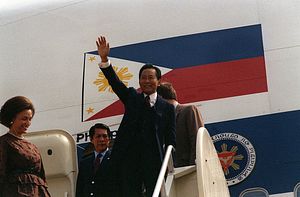This week, the Philippines began a manual recount of votes from the hotly contested May 2016 vice-presidential election. The recount has once again put the spotlight on the Philippines’ political history as well as the controversy surrounding current President Rodrigo Duterte.
In the Philippines, where voters cast ballots for president and vice president separately, the vice-presidential election in 2016 attracted much more attention than is often the case. And it also ended up being a much closer affair than the presidential election, which saw then-Davao City mayor Rodrigo Duterte win handily.
In that vice-presidential election, Ferdinand Marcos Jr, the son of late dictator Ferdinand Marcos, lost by just a few hundred thousand votes, according to tallies at the time. The victor was Leni Robredo, who hails from a dynastic family that had been aligned with progressive forces to oust Marcos in 1986 and is one of the fiercest opponents of Duterte today.
Robredo had run alongside Mar Roxas on the Liberal Party ticket, and faced off against Marcos, better known as Bongbong, who shared a ticket with political stalwart Miriam Defensor Santiago, who died in the September following the elections.
But Marcos had never accepted the outcome. Indeed, he has consistently argued for a recount and accused both Robredo and other players of cheating. This has undermined Robredo’s term alongside the broader problem of ever-worsening relations with Duterte himself.
The Marcos camp has long argued that this is more than a recount. Efforts from the election commission, or Comelec, to modernize the election process saw an overhaul of ballots. Printing issues meant the character “Ñ” turned into a question mark on some ballots – a flaw Marcos says proves a widespread conspiracy against him. Marcos had been in the lead during the count but says Robredo began to surge ahead after a change was made to Comelec servers to better understand the typographical error.
The claims were rejected by the Robredo team, as well as foreign election observers who said the 2016 election had been the cleanest in the Philippines’ history. But Marcos proceeded with the complaint all the way to the Supreme Court, who ordered this week’s recount of three provinces – Camarines Sur, Iloilo, and Negros Oriental – the results of which will determine if a nation-wide recount is needed.
Marcos’ desired outcome is transparent. He sees the vice-presidency as a stepping stone to his own presidency, a path which has unsurprisingly generated controversy in the Philippines given his name as well as the legacy of dictatorship amid the country’s present challenges under Duterte. Marcos believes he was been robbed of that opportunity by Robredo. He has also repeatedly denied rumors he would rerun for the Senate next year, saying he has no need since he should be the rightful vice president.
He is not alone. Some of Manila’s newspapers have been supportive of the need for a formal process to resolve the question once and for all. With such a small margin between votes in the formal count from 2016, the Robredo camp is clearly feeling the heat. A filing to the Supreme Court lodged by Robredo on Thursday asked for the recount team to consider ballots with vote ovals shaded 25 percent or more to be counted in favor, rather than the older 50 percent standard, over fears any decrease in her vote will see her turfed.
Duterte, meanwhile, has stayed relatively quiet on this issue compared to his other long list of controversial subjects. But the president and vice president have an extraordinarily tense relationship, which has been marked by continuous sniping and criticisms of each other’s leadership since Robredo resigned from the cabinet six months into the term. Robredo has not been afraid to speak frankly about the many concerns around democracy and human rights that Duterte’s presidency has raised.
Marcos, unsurprisingly has often exploited this fracture, positioning himself as the jovial, natural accompaniment to a Duterte presidency, most recently by praising the notorious Duterte “communication style” as effective. That has only further deepened concerns about an authoritarian resurgence that could further undermine the Philippines’ democracy and perhaps even take it back to the dark days of dictatorship.
Both Robredo and Marcos have in recent days reached out to supporters and suggested the same thing – stay optimistic because we are right. Irrespective of who comes out on top, the outcome will no doubt be an important part of the country’s political future.

































